Privatizations Spark Socialist Backlash: Evidence from East Germany’s Transformation
Preferences over Firm Ownership?
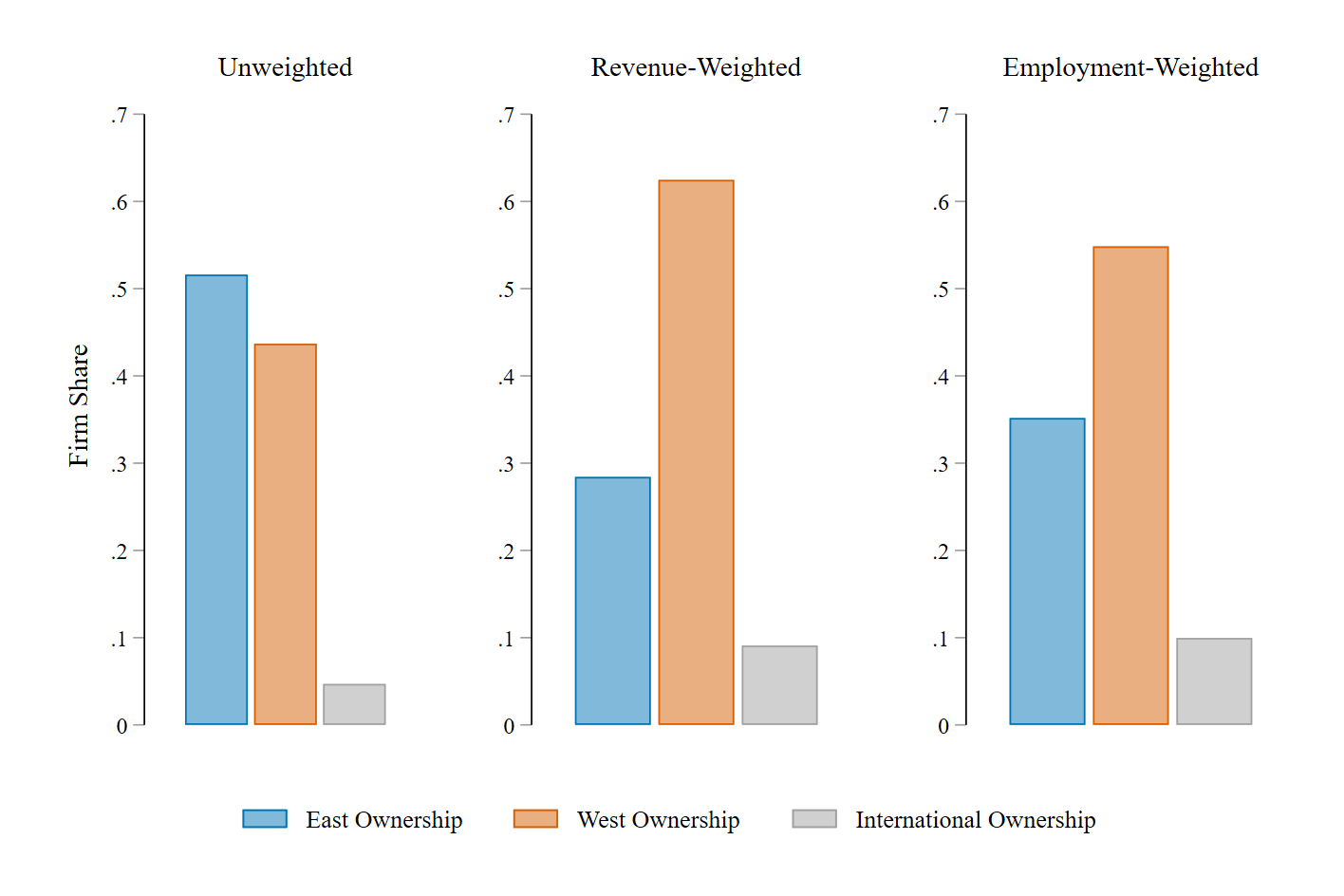
- Redistribution: State transfer policies e.g. taxes, benefits
- Predistribution: Market policies e.g. unions, protectionism, minimum wage
This paper
RQ: Do privatization and non-local ownership increase support for Socialist parties?
- Case study: East Germany's Economic Transformation 1990-1994
- Treatment: Local exposure (district and municipality) to privatizations
- Outcome: Vote for Party of Democractic Socialism (PDS), successor of regime party Socialist Unity Party (SED)
- DiD Evidence:
- (+) Privatizations to West Germans for 1994, (0) in 1998
- Spillovers
- Convergence in preferences for (p)redistribution (Alesina & Fuchs-Schuendeln 2007)?
- (0) Privatizations to East Germans through MBO
- (0) Job loss
Contributions
- Preferences for (P-)redistribution
- Kuziemko, Longuet-Marx, and Naidu (2022): U.S. less-educated prefer predistribution (protectionism, unions) over redistribution (taxes, transfers)
- → State-owned enterprises and local ownership as dimensions of predistribution
- Success of communist successor parties in transition countries
- Alternative explanations: Organizational strength (Tavits 2012, 2013), institutional legacies (Geddes 1995)
- → Supportive evidence of "vicissitudes of the transition and its economic consequences" (Grzymala-Busse 2002)
- Legacy of authoritarian systems on political preferences
- East vs West Germany "natural experiment": Preferences for redistribution (Fuchs-Schuendeln 2007), trust (Rainer & Siedler 2009), gender (Lippmann & Senik 2018), immigration (Carl 2018)
- → Adding to pre-WWII differences (Becker, Mergele and Woessmann 2020) this misses crucial transition period
The privatization program
- November 1989: Fall of Wall
- March 1990: Privatization agency "Treuhand" founded by last Socialist government (SED)
- September 1990: Detlev Rohwedder becomes director, agecny staffed with West German business elite
- 14 local branches headed by West Germans
- Minister presidents of East German states on supervisory board, rarely voted against directorate
- Restitutions decided in courts for expropriations in 1930ies and 1970ies, but not in 1940/50ies
- In charge of 100% of manufacturing firms, 27% services, 50% of jobs

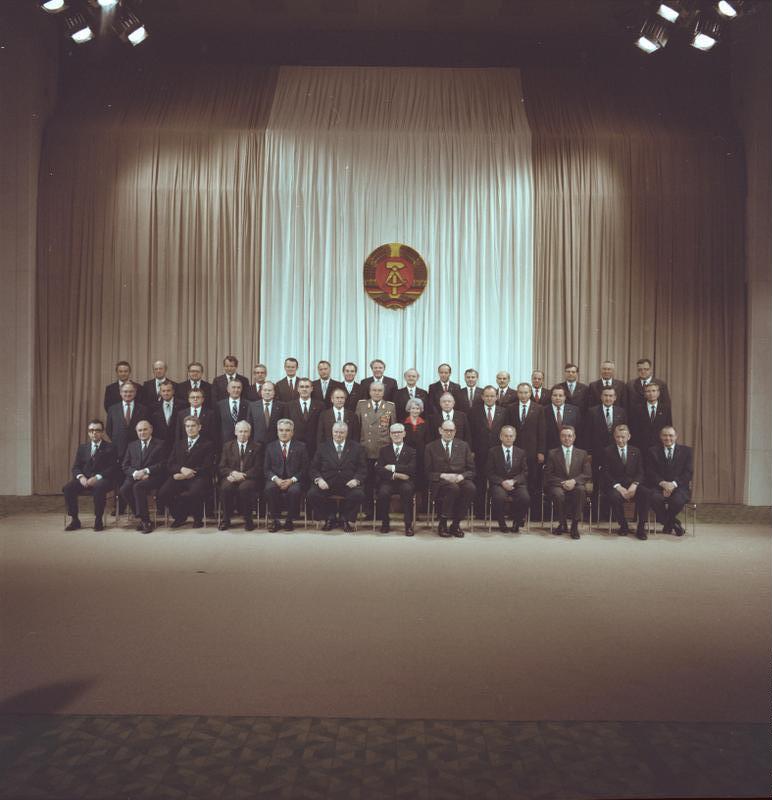
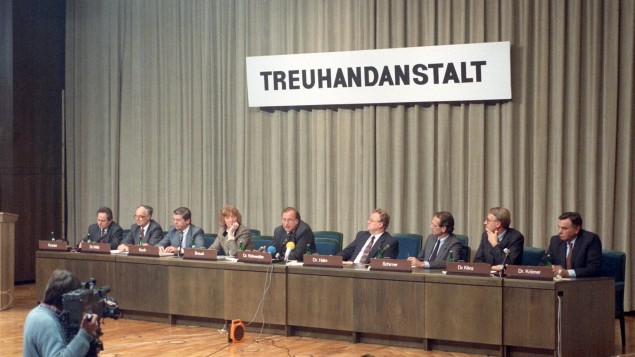

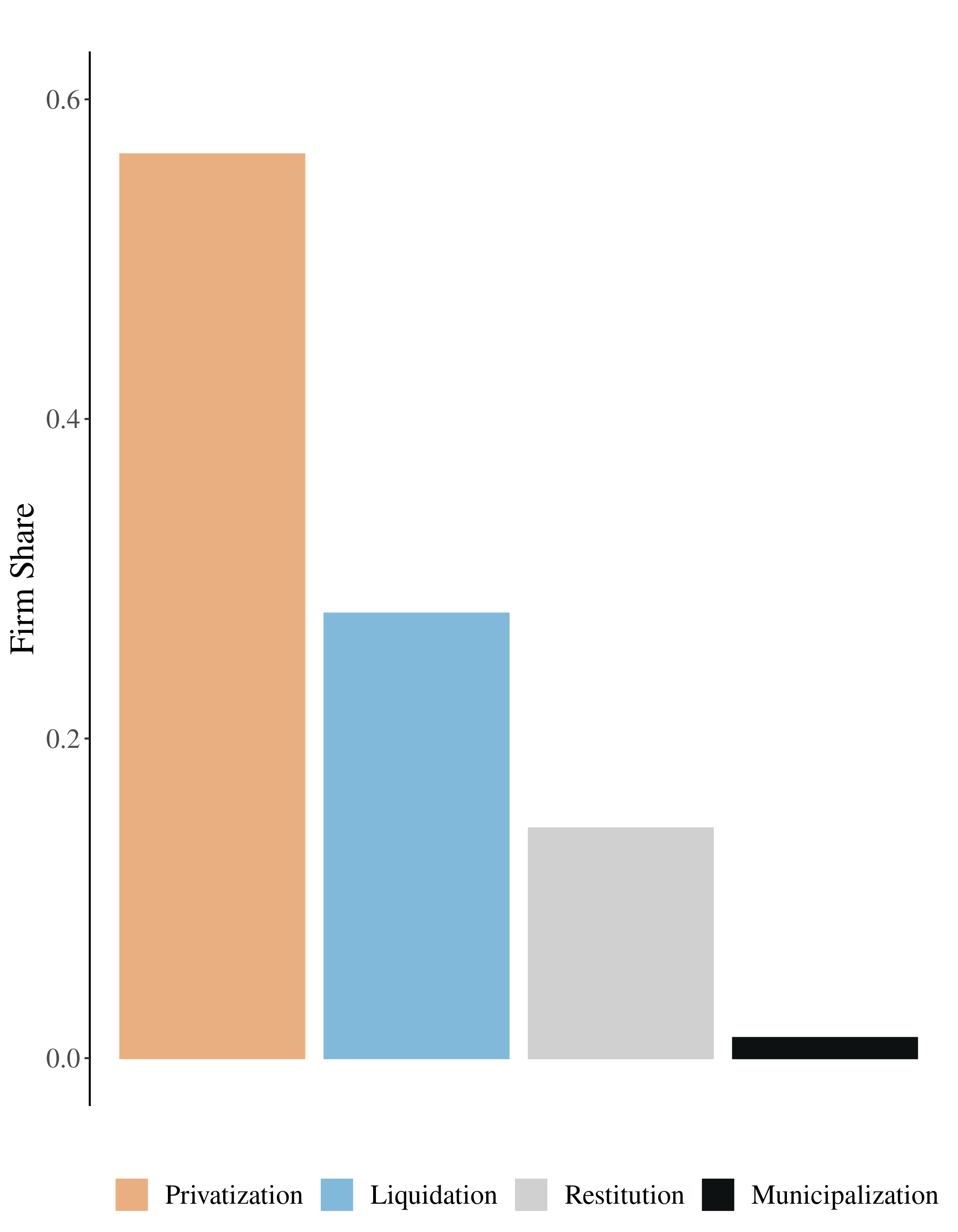
- April 1991: Director is murdered allegedly by left-wing terrorists (RAF)
- Dezember 1994: End of program
- More than 14k firms privatized (54%), liquidated (25%), restituted (13%) or remunicipalized (2%)
- Public ownership 1990→2000: Russia 70%→20%, China 55%→40% (Novokmet et al 2018)
Treatment: Share of privatized firms 1990-1994
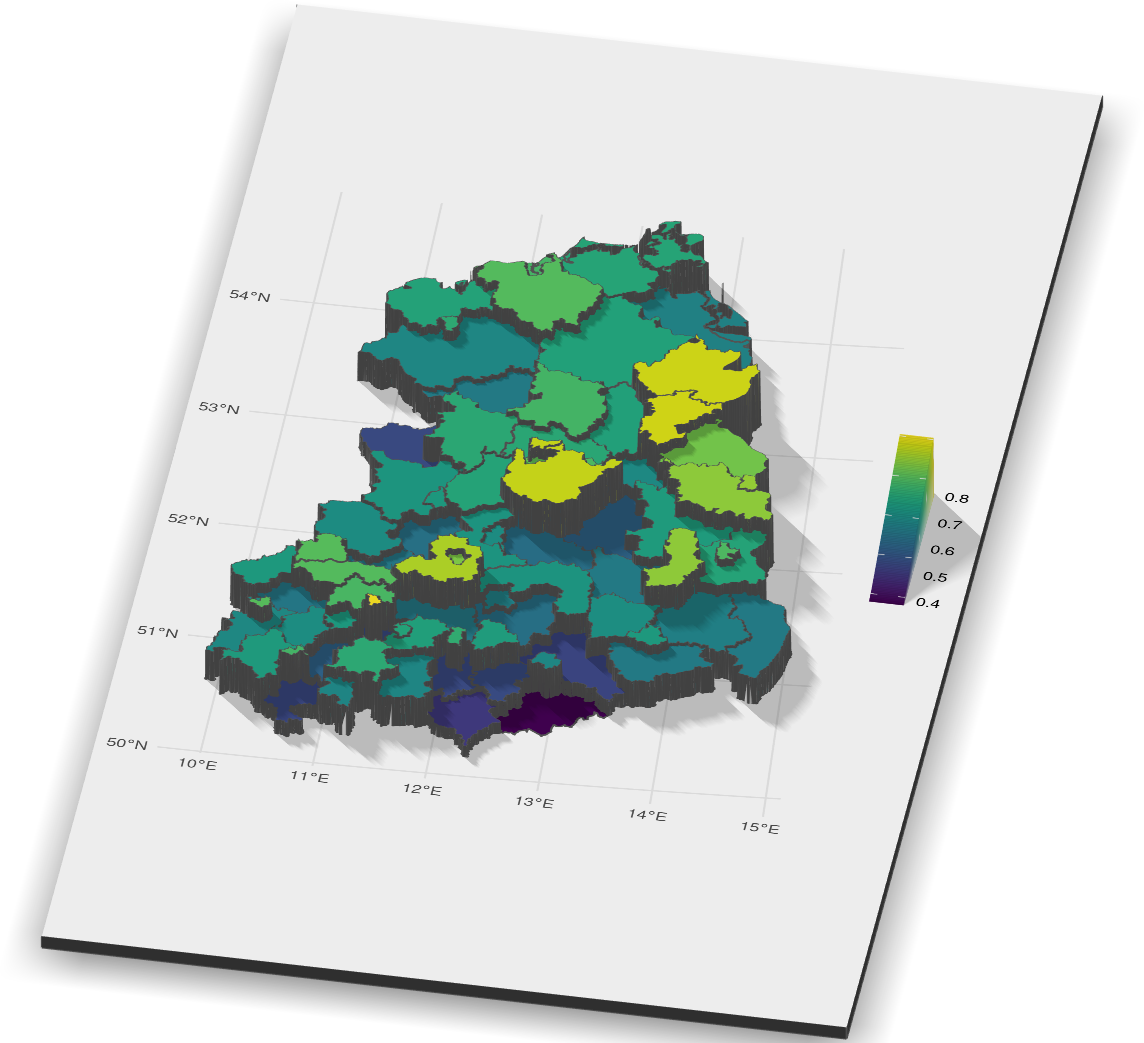
- Data: Privatization status of universe of firms, location from representative firm surveys (Hennicke, Lubczyk & Mergele 2020)
Treatment: Treuhand privatization decisions
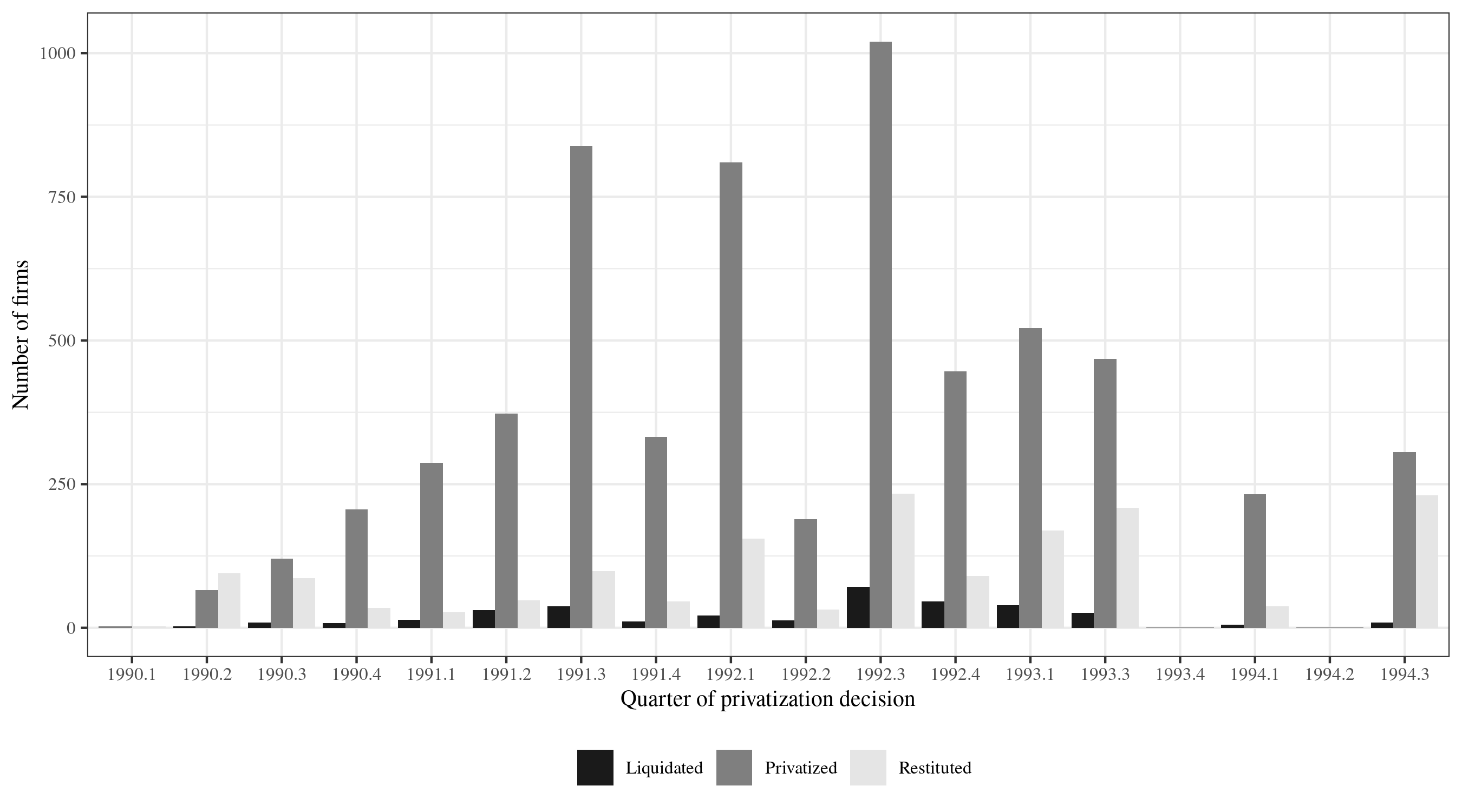
- Less than 5% of firms were privatized until the end of 1990
Outcome: PDS vote share
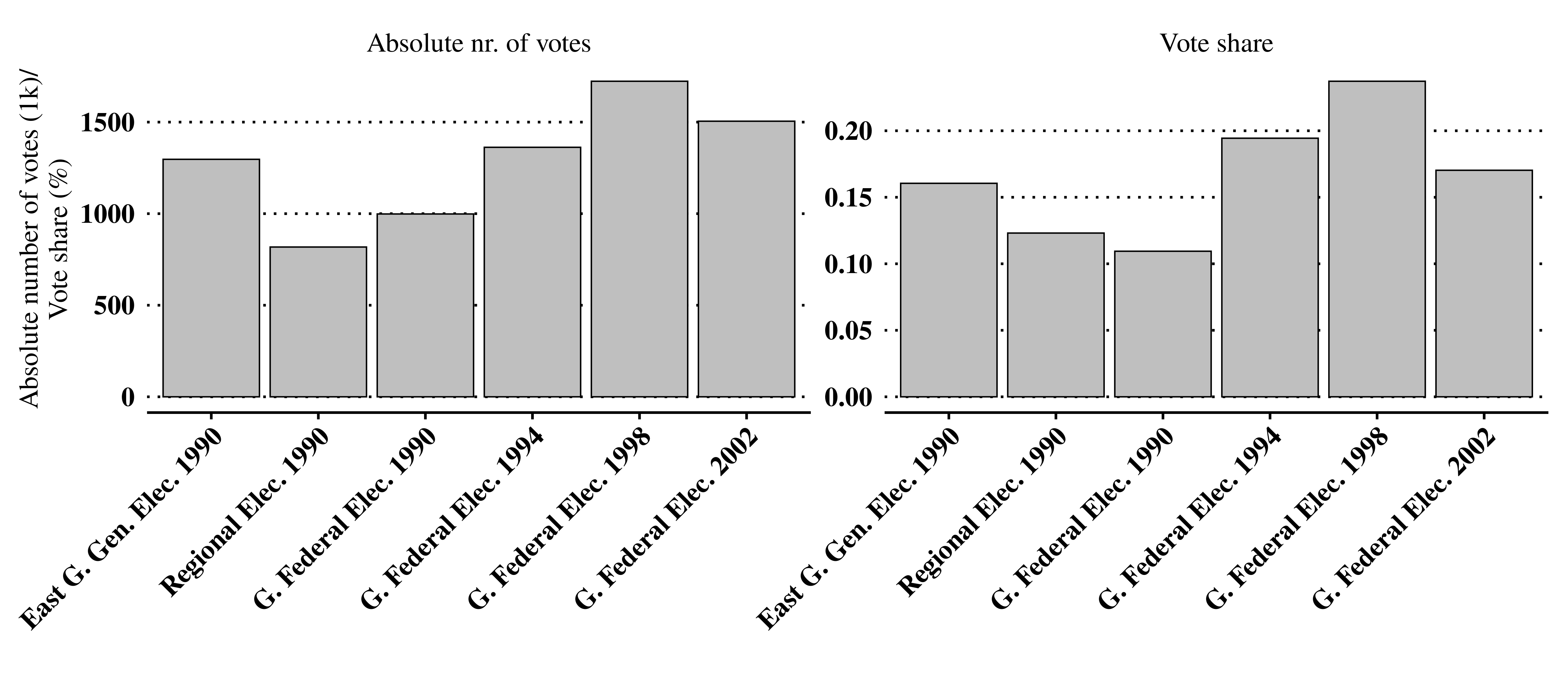
- PDS lost in last "free" election of the GDR to the Conservative Christ Democrats (CDU)
DiD estimation: TWFE with leads and lags
- Treatment: Share of privatizations and liquidations, omitting share of restitutions in adminstrative region $l$ for election $t$
- Fixed Effects: 5 elections $\tau_t$ and administrative regions $\nu_l$
- Controls: State and 1990 population trends
- Weights: Population
DiD: Socialist vote share
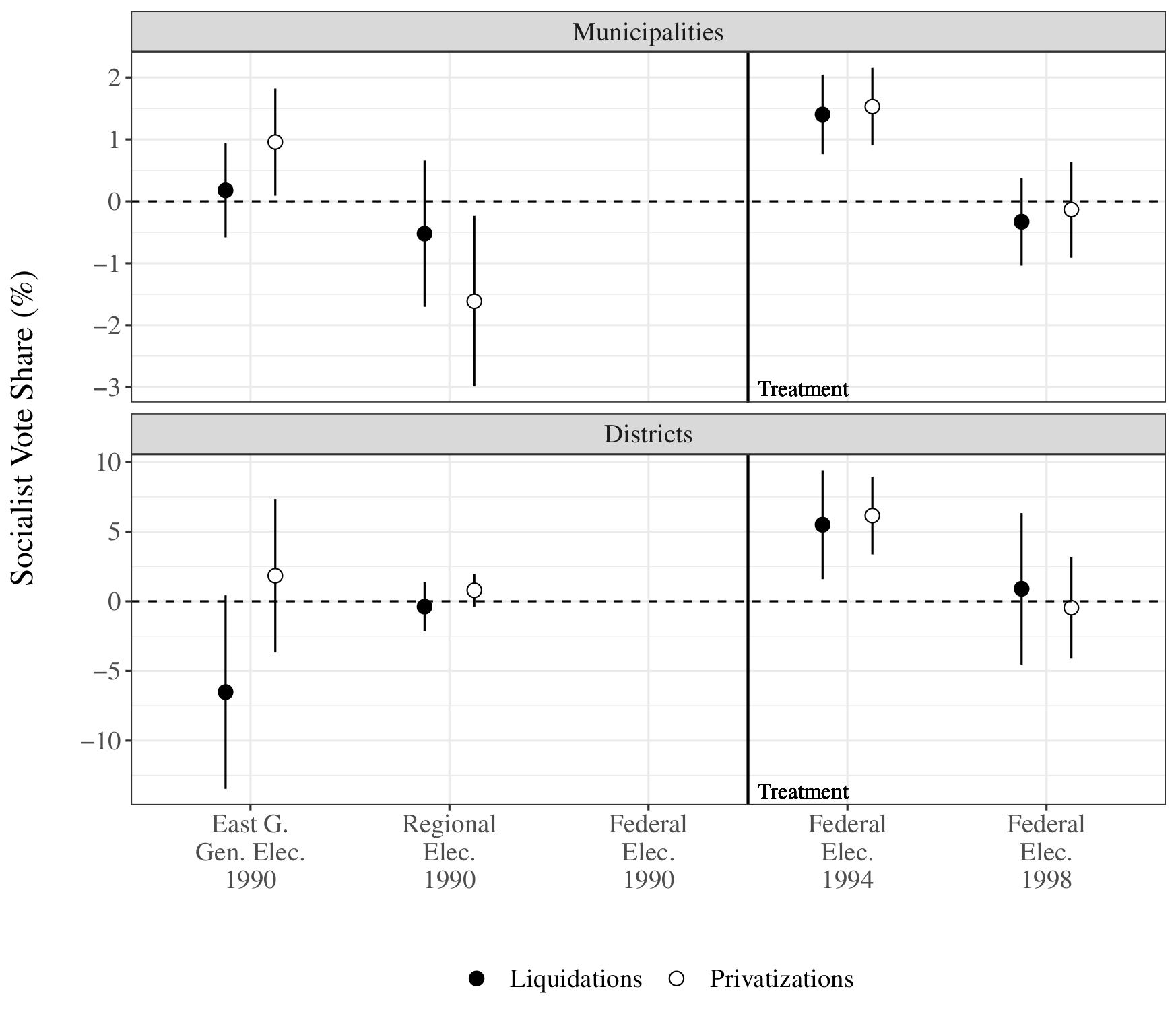
- Fed. Elec. 1994: 1 sd privatizations in municip. ↗ 0.55 pp
- Fed. Elec. 1994: 1 sd privatizations in districts ↗ 0.67 pp
DiD: Socialist vote share with untreated municipalities
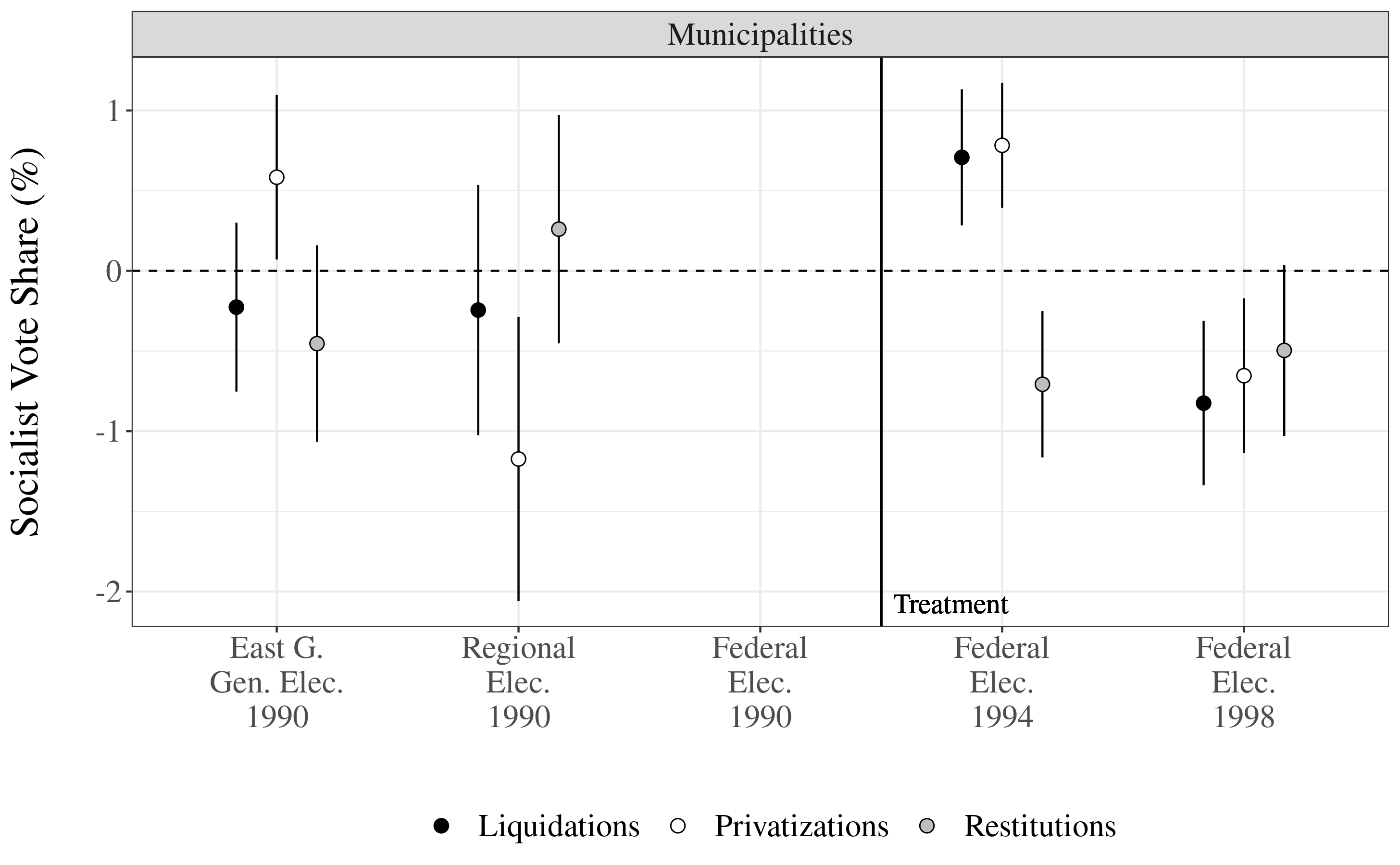
- Enable us to include restitutions
DiD: Binary Treatment

- Compares municipalities with Treuhand firms to municipalities without
- Requires weaker assumption of parallel trends than continuous treatment (Goodman-Bacon, Sant'Anna & Callaway 2022)
Privatizations: Sensitivity to Violations of Parallel Trends (Rambachan and Roth 2022)
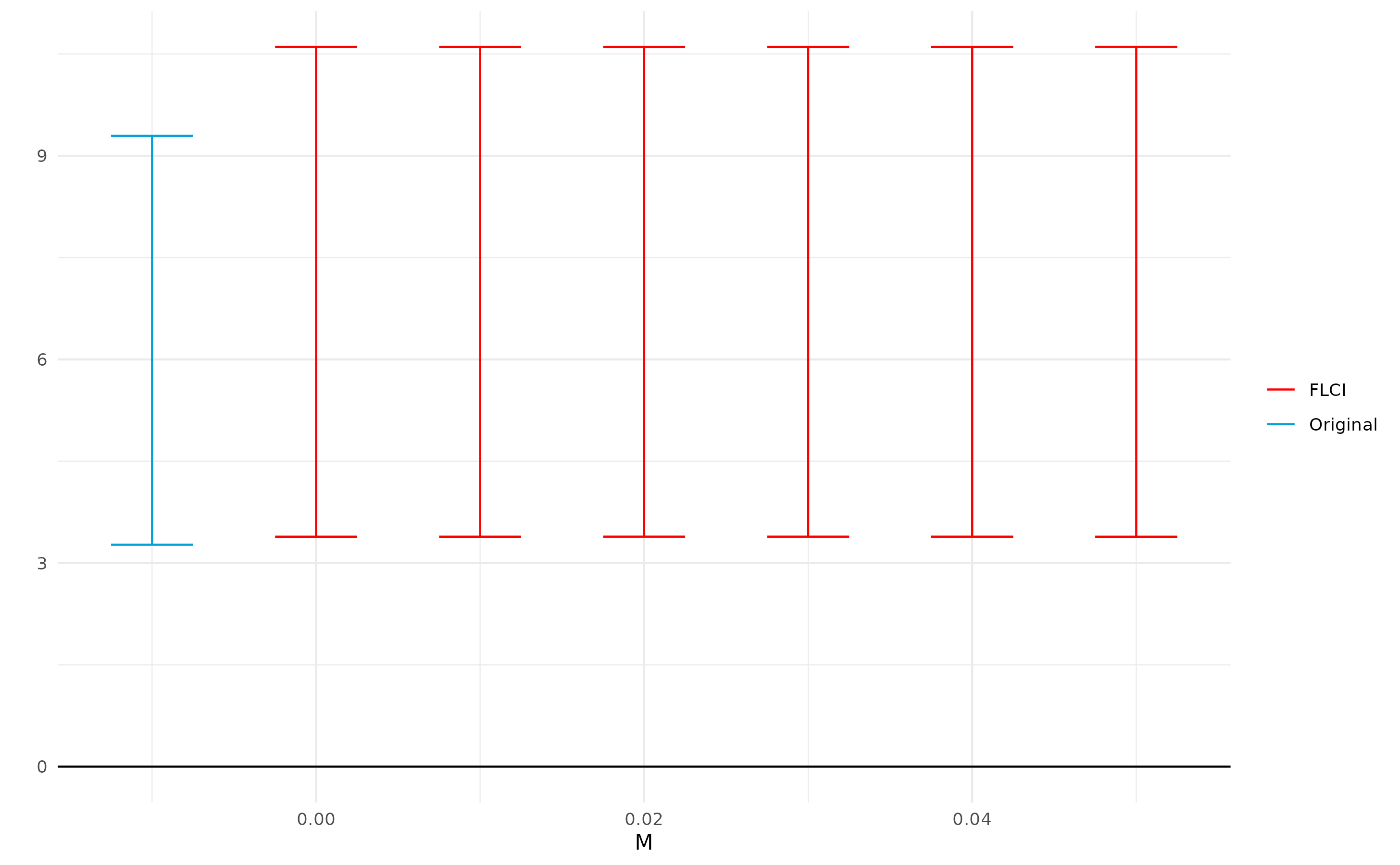
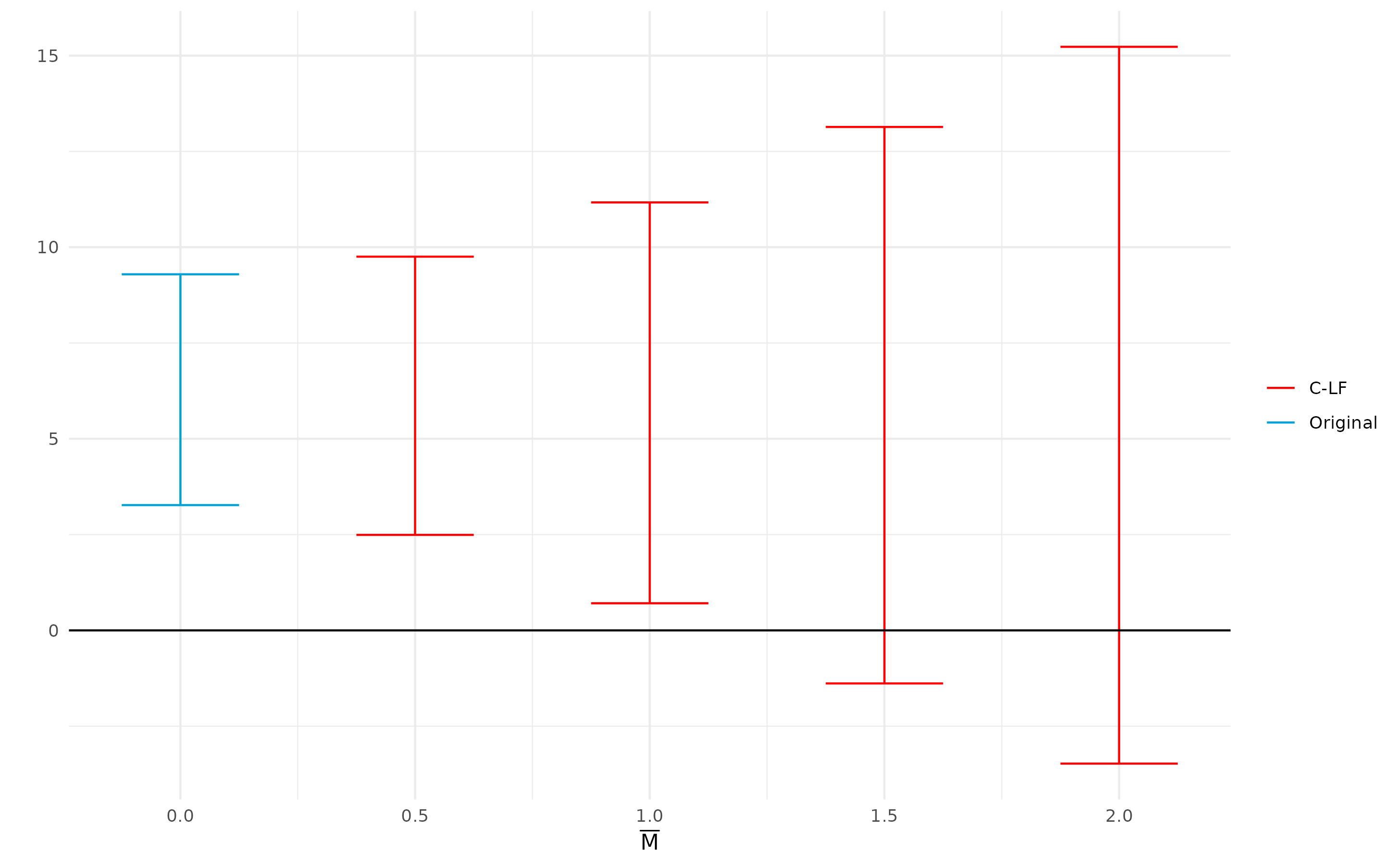
DiD: Spillovers and Persistence of Effect
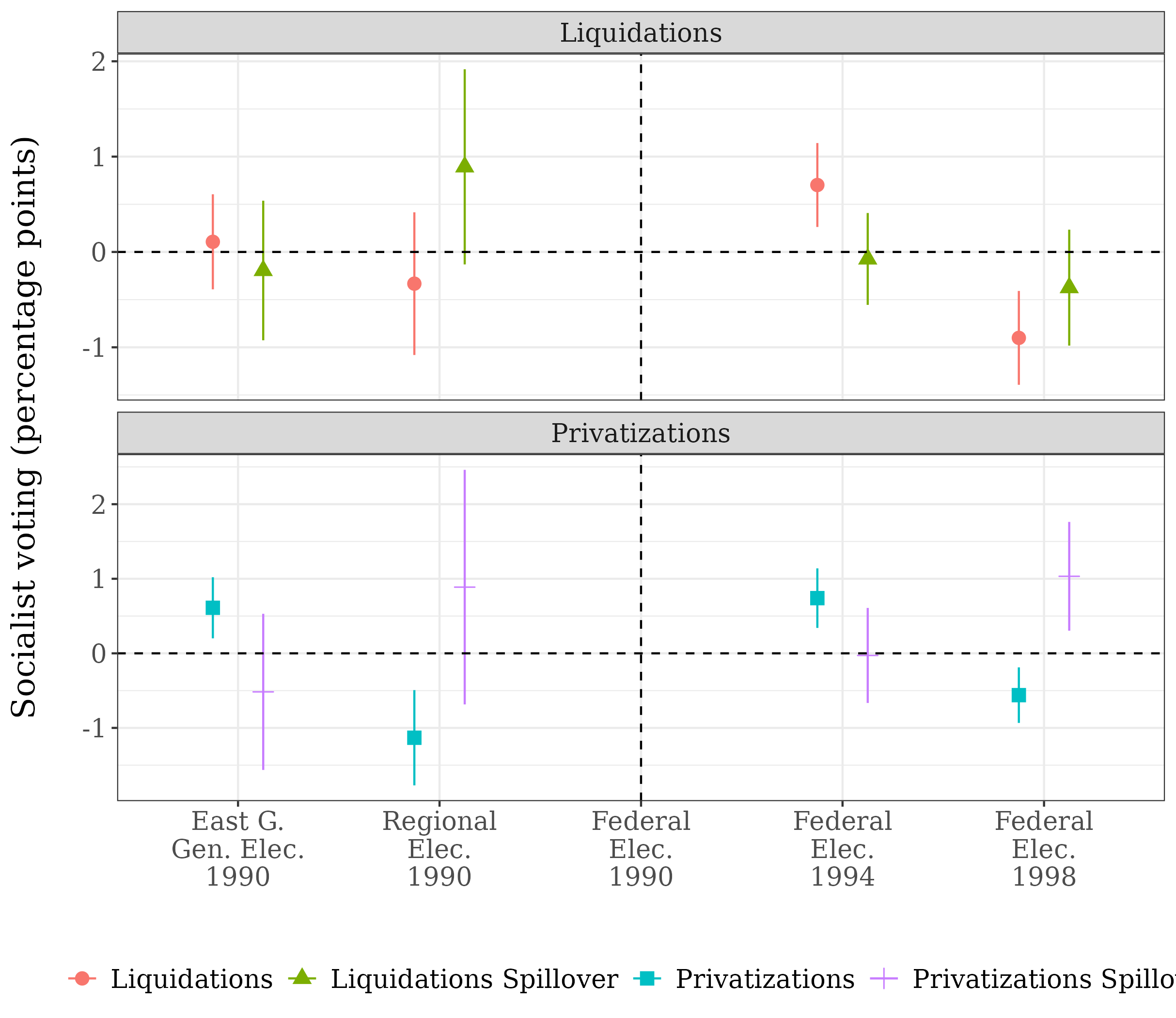
- Spillover: Average treatement intensity in 10km buffer
- Alternative: Convergence of preferences for (p)redistribution (Alesina and Fuchs-Schuendlen 2007)
Mechanism: Management-Buy-Out (MBO)
- Apart from restitutions: MBO only way for East Germans to gain control
| DV: Socialist Voting | ||
| Municipalities | Districts | |
| Privatizations (w/o MBOs) x 1994 General Election | 1.659*** | 7.551*** |
| (0.328) | (1.432) | |
| MBOs x 1994 General Election | 0.680 | -1.823 |
| (0.420) | (1.989) | |
| Liquidations x 1994 General Election | 1.386*** | 5.379** |
| (0.329) | (1.860) | |
| Observations | 7,306 | 559 |
| R2 | 0.937 | 0.972 |
| Adjusted R2 | 0.920 | 0.962 |
| Residual Std. Error | 0.018 (df = 5803) | 0.047 (df = 411) |
| Note: | *p<0.05; **p<0.01; ***p<0.001 | |
East vs West German attitudes in 1994
| Average agreement | ||
| (4-point scale) | ||
| West | East | |
| "Reunification was beneficial to West" | 2.1 | 3.0 |
| "Reunification was beneficial to East" | 3.1 | 2.4 |
| "East Germany's fate depends on whether they try hard" | 3.1 | 2.3 |
| "East Germans can't handle competitiveness of markets" | 3.0 | 2.6 |
| "Political organization is useless" | 2.6 | 2.7 |
| "State must interfere in economy to safeguard prices" | 2.9 | 3.4 |
| "Profits are fairly shared in society" | 2.1 | 1.6 |
| "Profits are necessary for a functioning economy" | 3.0 | 2.7 |
| "Class matters" | 2.8 | 3.4 |
| "Skills matter, not upbringing" | 3.0 | 2.6 |
Alternative mechanisms: Job Loss
| DV: Socialist Voting | ||
| Municipalities | Districts | |
| Privatizations x 1994 General Election | 1.281*** | 7.322** |
| (0.351) | (2.591) | |
| Liquidations x 1994 General Election | 2.612*** | 7.623* |
| (0.684) | (3.697) | |
| Privatizations x 1994 General Election x 1994 Employment Loss | 1.166 | -2.079 |
| (0.663) | (2.973) | |
| Liquidations x 1994 General Election x 1994 Employment Loss | -0.712 | -0.974 |
| (0.892) | (4.427) | |
| Observations | 6,589 | 559 |
| R2 | 0.939 | 0.970 |
| Adjusted R2 | 0.923 | 0.958 |
| Residual Std. Error | 0.018 (df = 5222) | 0.050 (df = 403) |
| Note: | *p<0.05; **p<0.01; ***p<0.001 | |
Alternative mechanisms: Individual job loss
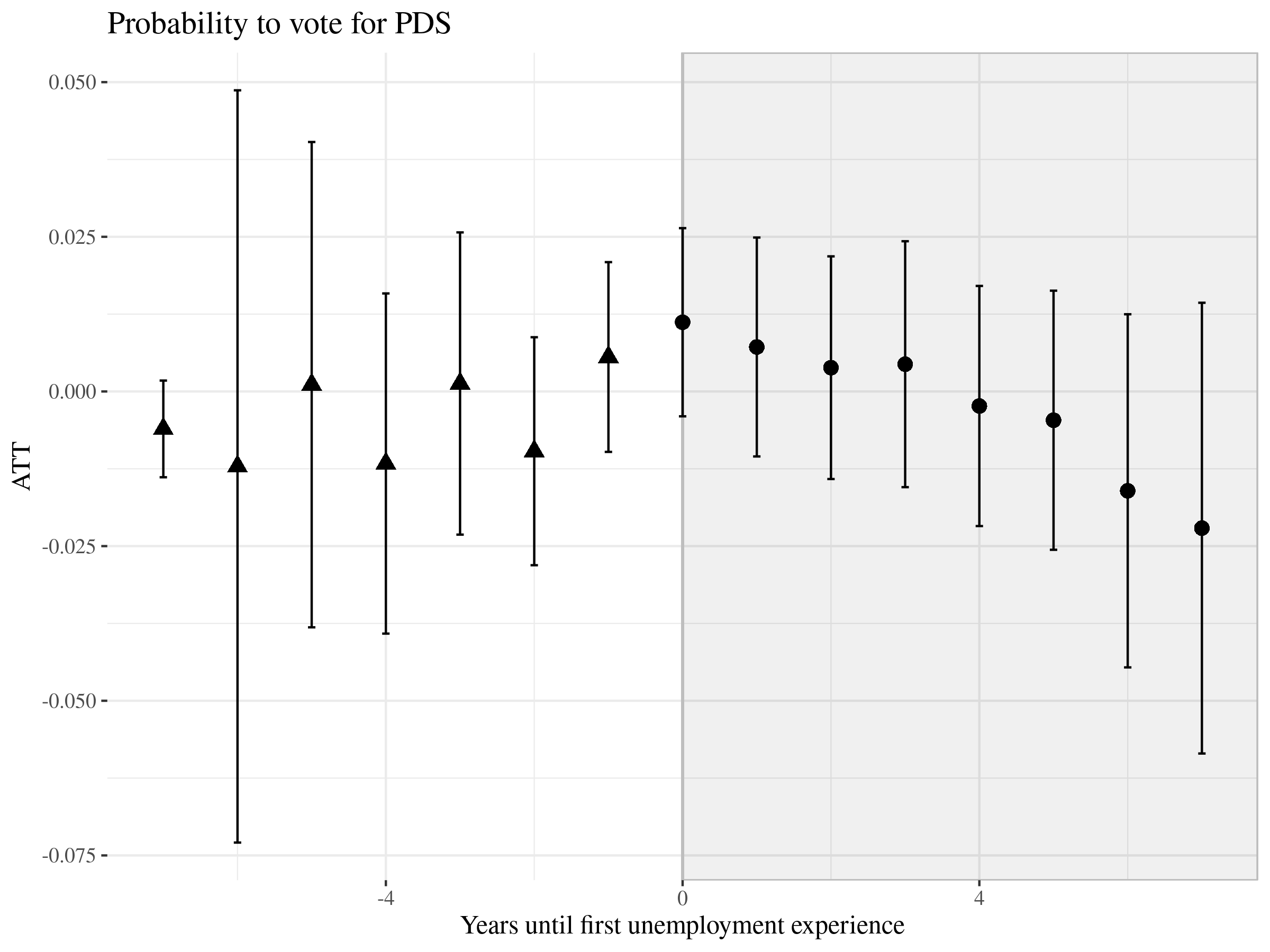
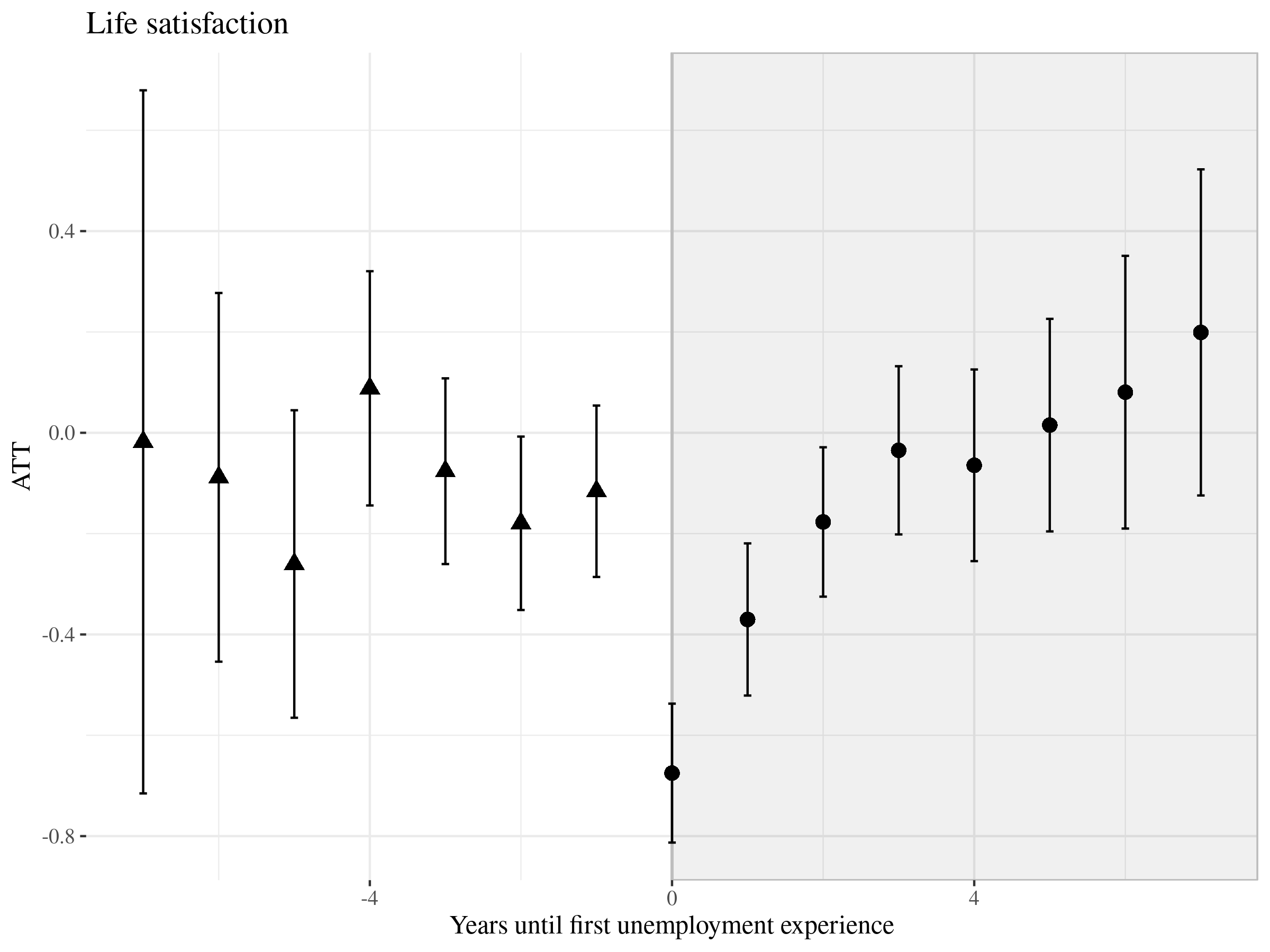
- Staggered treatment of first unemployment experience (Callaway & Sant'Anna 2021)
Alternative mechanisms: Corruption
- Entire local branch of Treuhand in Halle was exposed of corruption
| DV: Socialist Voting | ||
| Municipalities | Districts | |
| Privatizations x 1994 General Election | 1.595*** | 7.198*** |
| (0.337) | (1.518) | |
| Liquidations x 1994 General Election | 1.382*** | 7.022** |
| (0.344) | (2.208) | |
| Privatizations x 1994 General Election x Halle | -1.049 | -5.103 |
| (0.745) | (7.052) | |
| Liquidations x 1994 General Election x Halle | 0.412 | -3.628 |
| (0.854) | (12.104) | |
| Observations | 7,306 | 559 |
| R2 | 0.937 | 0.970 |
| Adjusted R2 | 0.921 | 0.958 |
| Residual Std. Error | 0.018 (df = 5795) | 0.050 (df = 403) |
| Note: | *p<0.05; **p<0.01; ***p<0.001 | |
Conclusion
- East German transition
- Rapid average wage growth and investment into infrastructure
- Loss of local control of firms
- Privatizations led to resurgence of reorganized Socialist Party
- Expression of preferences over economic ownership